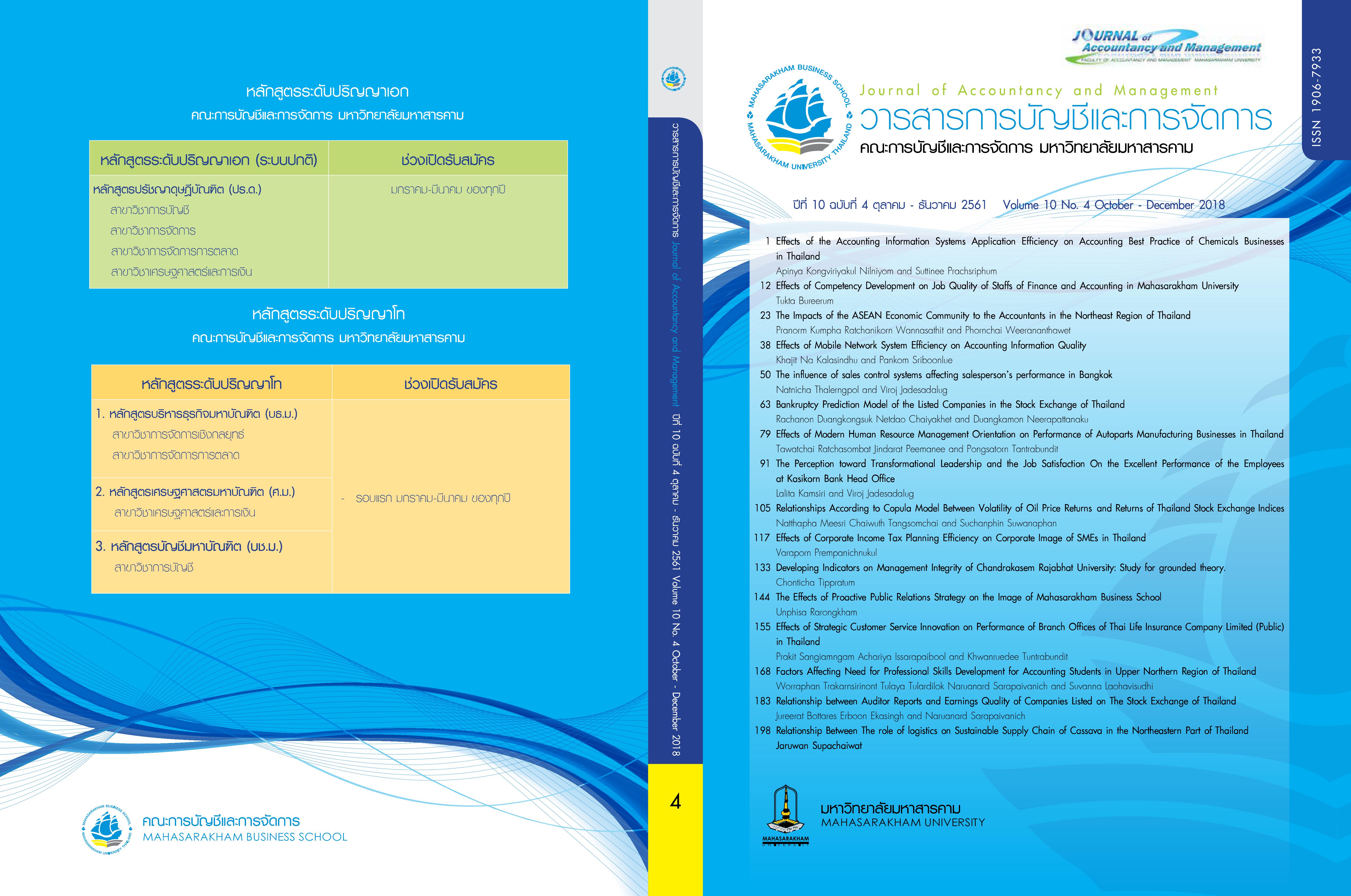ความสัมพันธ์ตามแบบจำลองคอปปูลาของความผันผวนระหว่างผลตอบแทนของราคาน้ำมันกับผลตอบแทนของดัชนีราคาหุ้นตลาดหลักทรัพย์แห่งประเทศไทย
Main Article Content
บทคัดย่อ
การศึกษานี้มีวัตถุประสงค์เพื่อหาความสัมพันธ์ของความผันผวนโดยใช้แบบจำลองคอปปูลา ซึ่งใช้ข้อมูลรายวันตั้งแต่เดือนมกราคม พ.ศ. 2550 ถึงเดือนธันวาคม พ.ศ. 2559 ระยะเวลารวม 10 ปี จากการศึกษาพบว่า แบบจำลอง Student-t Copula คือ แบบจำลองที่เหมาะสมที่สุดในการศึกษาความสัมพันธ์ระหว่างความผันผวนผลตอบแทนราคาน้ำมันกับความผันผวนผลตอบแทนของดัชนีราคาหุ้นตลาดหลักทรัพย์แห่งประเทศไทย ผลลัพธ์จากแบบจำลองนี้พบว่า ทั้งสองตัวแปรมีความสัมพันธ์ที่ปลายหางทั้งสองข้างของข้อมูล ซึ่งบ่งบอกว่าเกิดความสัมพันธ์ในช่วงที่ความผันผวนต่ำมากและความสัมพันธ์ในช่วงที่ความผันผวนสูงมาก แต่เป็นค่าความสัมพันธ์อยู่ในระดับต่ำ ในขณะที่การศึกษาความสัมพันธ์ระหว่างความผันผวนผลตอบแทนของราคาน้ำมันกับความผันผวนผลตอบแทนของดัชนีราคาหมวดธุรกิจพลังงานและสาธารณูปโภคพบว่า แบบจำลองที่เหมาะสมที่สุดคือ แบบจำลอง Normal Copula แสดงว่าความสัมพันธ์ที่ปลายหางทั้งสองข้างของข้อมูลไม่มีความสัมพันธ์กัน ดังนั้นการนำผลตอบแทนของราคาน้ำมันมาใช้เป็นตัวแทนในการหาแนวโน้มของดัชนีราคาหุ้นตลาดหลักทรัพย์แห่งประเทศไทยอาจจะไม่เหมาะสม เนื่องจากมีความสัมพันธ์กับดัชนีราคาหุ้นตลาดหลักทรัพย์แห่งประเทศไทยอยู่ในระดับต่ำ
Downloads
Article Details
บทความที่ได้รับการตีพิมพ์เป็นลิขสิทธิ์ของวารสารการบัญชีและการจัดการ
ข้อความที่ปรากฏในบทความแต่ละเรื่องในวารสารวิชาการเล่มนี้เป็นความคิดเห็นส่วนตัวของผู้เขียนแต่ละท่านไม่เกี่ยวข้องกับมหาวิทยาลัยมหาสารคาม และคณาจารย์ท่านอื่นๆในมหาวิทยาลัยฯ แต่อย่างใด ความรับผิดชอบองค์ประกอบทั้งหมดของบทความแต่ละเรื่องเป็นของผู้เขียนแต่ละท่าน หากมีความผิดพลาดใดๆ ผู้เขียนแต่ละท่านจะรับผิดชอบบทความของตนเองแต่ผู้เดียว
เอกสารอ้างอิง
Al Hayky, A., & Naim, N. (2016). The relationship between oil price and stock market index: An empirical study from Kuwait.
As presented at Middle East Economic Association 15th International Conference.
Ciner, C. (2001). Energy shocks and financial markets: nonlinear linkages. Studies in nonlinear dynamics and econometrics, 5(3), 203-212.
Guliman, S. D. O. (2015). Oil prices and stock market: A Philippine perspective. Business and Economic Research, 5(2), 122-135.
Nguyen, C. C., & Bhatti, M. I. (2012). Copula model dependency between oil prices and stock markets: Evidence from China and Vietnam.
Journal of International Financial Markets, Institutions and Money, 22(4), 758-773.
Puarattanaarunkorn, O., Kiatmanaroch, T., & Sriboonchitta, S. (2016). Dependence between Volatility of Stock Price Index Returns and Volatility
of Exchange Rate Returns under QE Programs: Case Studies of Thailand and Singapore. Springer International Publishing, 415-435
Sklar, A. (1959). Fonctions de repartition an dimensions et leurs marges. Publications de l'Institutde Statistique de l'Universite de Paris, 8.
Sokolinskiy, O., & van Dijk, D. (2011). Forecasting volatility with Copula-based time series models.Tinbergen Institute Discussion Paper, 11, 125.


